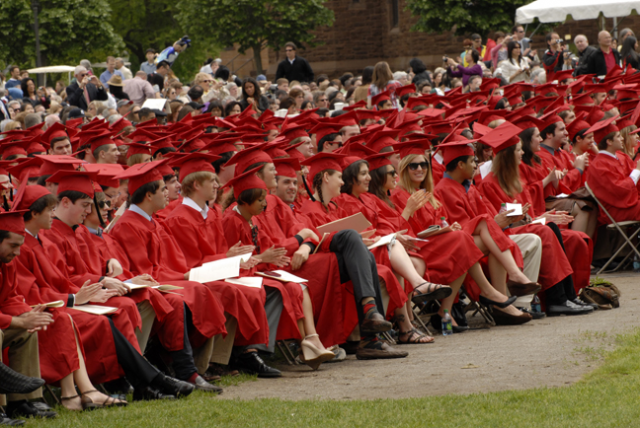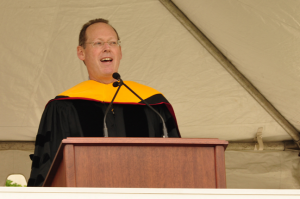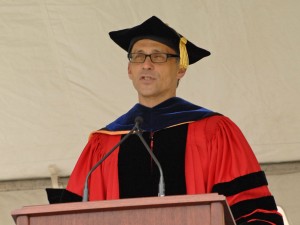Wesleyan Celebrates 179th Commencement, Class of 2011

“Keep the habits of critical analysis you’ve learned at Wesleyan. This may sound like an austere and overly-sober message,” said Dr. Paul E. Farmer. “But by critical I don’t mean you should be contrarian…By being critical I mean taking an extra moment to interrogate accepted wisdom.”
This observation was the cornerstone of the address delivered by Dr. Farmer at the 179th Commencement Ceremonies at Wesleyan University, on Sunday, May 22.
Farmer, a physician-anthropologist and author, founded Partners in Health, an international nonprofit organization that provides direct health care services to the sick living in poverty. Partners in Health also undertakes research and advocacy on behalf of under-served, impoverished populations. Farmer is also the Kolokotrones University Professor and Chair of the Department of Global Health and Social Medicine at Harvard Medical School; Chief of the Division of Global Health Equity at Brigham and Woman’s Hospital; and the United Nations Deputy Special Envoy for Haiti under former U.S. President Bill Clinton.
Farmer shared insights about his work bringing medical care to underserved populations in Haiti, Rwanda, and other countries throughout the world. This spanned his experiences from his first moments in Haiti after leaving medical school, to hosting a young cancer patient named Maveline and her mother at his small faculty apartment in Cambridge, Mass., for a year while Maveline received chemotherapy, to his current project of building a major medical training facility in central Haiti. Through it all Farmer pointed to the importance of service and dealing with adversity, and the spirit to always move forward in such pursuits.

“When you are discouraged, stop and think about Rwanda’s recovery, or Maveline’s, or some other evidence of the value of persistence and knowledge and solidarity and connection; think about the friendships you’ve made here and draw on them,” he said. “I know the world can be a troubled place, but I look out over this crowd and know that the future is in good hands.”
Farmer was one of five people who received honorary doctorates at the ceremony: Broadway singer Barbara Nell Cook; Alberto Ibarguen ’66 P’97, CEO of the John S. and James L. Knight Foundation; and community service leaders and friends of the university Jean Adams Shaw P’79 and Ralph “Biff” H. Shaw II ’51, P’79.
During the ceremony, Robert Patricelli ’61 P’88 P ’90 and Margaret Sweetland Patricelli were awarded the Raymond E. Baldwin Medal. Named for the late Judge Raymond E. Baldwin ’16, the Baldwin Medal is the highest honor Wesleyan’s alumni body presents for extraordinary service to Wesleyan or for careers and other activities which have contributed significantly to the public good.
They were joined by their new classmates on Andrus Field: 719 students who received Bachelor of Arts degrees; 45 awarded a Master of Arts in Liberal Studies degree; 35 who were granted Master of Arts degrees; and 14 bestowed with Doctor of Philosophy degrees.
In his address to the Class of 2011, President Michael S. Roth ’78 saluted the graduates and the honorary degree recipients, and spoke of the advantages of Wesleyan education and a liberal arts degree.
“At Wesleyan we understand the sciences to be a vital part of the liberal arts and not just pre-professional training. The key to our success in the future will be an integrative education that doesn’t isolate the sciences from other parts of the curriculum, and that doesn’t shield the so-called creative and interpretive fields from a vigorous understanding of the problems addressed by scientists. Interdisciplinary science programs are among our fastest growing majors, and initiatives linking the sciences, arts and humanities have been areas of intense creative work. Students and professors aren’t crossing departmental boundaries in order to be fashionably interdisciplinary. They join forces to address specific problems or in pursuit of particular opportunities. At Wesleyan we understand the sciences to be a vital part of the liberal arts and not just pre-professional training. The key to our success in the future will be an integrative education that doesn’t isolate the sciences from other parts of the curriculum, and that doesn’t shield the so-called creative and interpretive fields from a vigorous understanding of the problems addressed by scientists. Interdisciplinary science programs are among our fastest growing majors, and initiatives linking the sciences, arts and humanities have been areas of intense creative work. Students and professors aren’t crossing departmental boundaries in order to be fashionably interdisciplinary. They join forces to address specific problems or in pursuit of particular opportunities.”

Roth also said that those calling for a an increase focus on math or science at the expense of the liberal arts, all in the name of national competitiveness, are ultimately making a grave error.
“Around the country, the retreat from liberal learning in the name of a more efficient, practical college education is likely to lead to the opposite: men and women who are trained for yesterday’s problems and yesterday’s jobs, men and women who have not reflected on their own lives in ways that allow them to tap into their capacities for innovation and for making meaning out of their experience. Under the guise of “practicality” we are really hearing calls for conformity, calls for conventional thinking that will impoverish our economic, cultural and personal lives.”
Margot Boyer-Dry ’11 delivered the Senior Commencement Address and she talked about a phrase she heard during her first year on campus, “keep Wesleyan weird.” However, what she found over her four years wasn’t a culture that was weird but rather unique.
“So in the end it turns out that, what some have taken for Wesleyan students’ weirdness is actually our capacity to follow our bliss… and our aptitudes, and our principles. The space that Wesleyan makes for us to develop that capacity is, in part, what makes this environment singular. Throughout these past years, I have reflected on how lucky I am—how lucky we all are— to be able watch those around us do what they feel they need to do. It is a gift to watch all of you dance, speak, write, play, and simply be; it has been a gift for us all to be together. As we prepare to set out into the world.”
During the ceremony, the Binswanger Prize for Excellence in Teaching was awarded to Wai Kiu Chan, associate professor of mathematics; Scott Higgins, associate professor of film studies; and Scott L. Plous, professor of psychology.
Also noted in the ceremony was the retirement of Henry Abelove, the Wilbur Fisk Osborne Professor of English; Judith C. Brown, professor of history; Ann Ducille, professor of English; Charles Lemert, the John E. Andrus Professor of Social Theory; Alvin Lucier, the John Spencer Camp Professor of Music; and Russell Davis Murphy, professor of government.
The text of President Michael S. Roth’s address to the Class of 2011 graduates can be found here.
The text of the senior class welcome by Margo Boyer-Dry ’11 can be found here.
Information on the honorary degrees can be found here.
Information on the Binswanger recipients can be found here.
Photographs and video can be found here.

